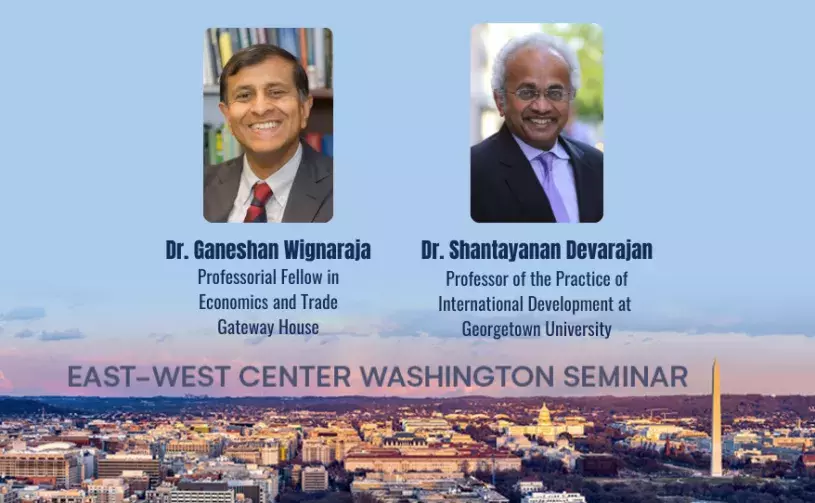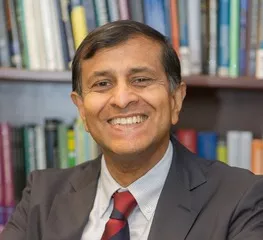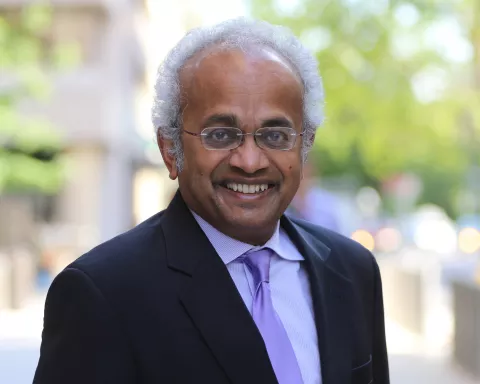Error message

OFFICE/DEPARTMENT
The East-West Center in Washington invites you to an
Indo-Pacific Foreign Policy and Defense Series seminar:
The New Sri Lanka: The Bridge Between India, China, and the United States
A Conversation With:
Dr. Ganeshan Wignaraja
Professorial Fellow in Economics and Trade
Gateway House
Shantayanan Devarajan
Professor of the Practice of International Development
Georgetown University
Dr. Satu Limaye (Moderator)
Vice President, East-West Center &
Director, Research Program and East-West Center in Washington
Strategically located in the Indian Ocean, Sri Lanka is once again on the radar of the world’s great powers. The label of being caught in a "Chinese debt trap” of low return Belt and Road Initiative (BRI) infrastructure projects has struck once the island defaulted on external debt in April 2022 and suffered a crippling economic crisis. Neighboring India initially played a critical first responder role with foreign aid until an International Monetary Fund (IMF) Program began in March 2023. Alongside this, the United States gave foreign aid and advocated for the IMF.
With the economy stabilizing faster than expected, there is optimism that Sri Lanka could be a bridge between India, China and the United States by adopting a neutral foreign policy, market-oriented reforms and free trade agreements with dynamic Asian countries. This seminar analyzes Sri Lanka’s economic crisis and its foreign relations with India, China, and the United States as well the influence of domestic and international factors. It will aim to show the policy-level challenges that great power rivalry poses for established economic and political practices and will discuss how these challenges can be mitigated by smaller states.

Dr. Ganeshan Wignaraja is the Professorial Fellow in Economics and Trade at Gateway House in India and a Senior Research Associate at the UK’s Overseas Development Institute (ODI). He is also the Advisor to the President of Sri Lanka on Strategic Trade Policy, a Board Member of the Geopolitical Cartographer and a Member of a committee at the Central Bank of Sri Lanka on monetary policy and financial stability. Previously, he was the Director of Research at the Asian Development Bank Institute, a Visiting Scholar at the IMF, Head of Trade and Competitiveness at Maxwell Stamp PLC and the Executive Director of Sri Lanka’s Foreign Ministry think tank. He has a DPhil in economics from Oxford University and has published extensively on macroeconomics, international trade, economic development and geoeconomics.

Shantayanan Devarajan is Professor of the Practice of International Development at Georgetown University’s School of Foreign Service, where he teaches development policy, fragility and conflict, and climate change. He is also an advisor to the governments of Maldives and Sri Lanka and to the Ebony Center in South Sudan. He spent 28 years at the World Bank, where he was the Senior Director for Development Economics, the Chief Economist of the South Asia, Africa, and Middle East and North Africa regions and of the Human Development Network, and Research Manager for Public Economics. Before joining the World Bank, he was on the faculty of Harvard Kennedy School. The author or co-author of over 150 publications, his research covers public economics, trade policy, natural resources and the environment, political economy, and general-equilibrium modeling of developing countries. Born in Sri Lanka, Shanta received his A.B. in mathematics from Princeton University and his Ph.D. in economics from the University of California, Berkeley.

Dr. Satu P. Limaye is Vice President of the East-West Center and Director of Research, East-West Center in Washington, and interim director of the Professional Development Program. He created and directs the Asia Matters for America initiative and is the founding editor of the Asia Pacific Bulletin. He is also a Senior Advisor at CNA Corp (Center for Naval Analyses). He is a graduate of Georgetown University and received his doctorate from Oxford University (Magdalen College) where he was a George C. Marshall Scholar.
He publishes and speaks on Indo-Pacific regional issues and supports various US government, foundation, fellowship, and professional organizations. He recently served on the Center for New American Security (CNAS) Task Force on the US-Philippines Alliance, United States Institute of Peace (USIP) Senior Study Group on the North Pacific, Project 2049 Study Group on the US-Australia Alliance, and Global Taiwan Institute-Taiwan Asia Exchange Foundation project on Taiwan’s New Southbound Policy. He serves on the Korea Economic Institute (KEI) Advisory Council and editorial board of East Asian Policy and regional editor of Global Asia.
In-Person Seminar Protocols
The program will follow the latest guidance concerning COVID-19 protocols in Washington, DC. Masks are optional and proof of vaccination will not be required for entry. As an outside guest, you will be required to check in via QR code to report on your health status to assist in contact tracing if necessary. This data will be stored internally and not released publicly.
This seminar is free and open to the public. This seminar will be on-the-record, but not recorded or streamed. Light refreshments will be served.
The East-West Center in Washington invites you to an
Indo-Pacific Foreign Policy and Defense Series seminar:
The New Sri Lanka: The Bridge Between India, China, and the United States
A Conversation With:
Dr. Ganeshan Wignaraja
Professorial Fellow in Economics and Trade
Gateway House
Shantayanan Devarajan
Professor of the Practice of International Development
Georgetown University
Dr. Satu Limaye (Moderator)
Vice President, East-West Center &
Director, Research Program and East-West Center in Washington
Strategically located in the Indian Ocean, Sri Lanka is once again on the radar of the world’s great powers. The label of being caught in a "Chinese debt trap” of low return Belt and Road Initiative (BRI) infrastructure projects has struck once the island defaulted on external debt in April 2022 and suffered a crippling economic crisis. Neighboring India initially played a critical first responder role with foreign aid until an International Monetary Fund (IMF) Program began in March 2023. Alongside this, the United States gave foreign aid and advocated for the IMF.
With the economy stabilizing faster than expected, there is optimism that Sri Lanka could be a bridge between India, China and the United States by adopting a neutral foreign policy, market-oriented reforms and free trade agreements with dynamic Asian countries. This seminar analyzes Sri Lanka’s economic crisis and its foreign relations with India, China, and the United States as well the influence of domestic and international factors. It will aim to show the policy-level challenges that great power rivalry poses for established economic and political practices and will discuss how these challenges can be mitigated by smaller states.

Dr. Ganeshan Wignaraja is the Professorial Fellow in Economics and Trade at Gateway House in India and a Senior Research Associate at the UK’s Overseas Development Institute (ODI). He is also the Advisor to the President of Sri Lanka on Strategic Trade Policy, a Board Member of the Geopolitical Cartographer and a Member of a committee at the Central Bank of Sri Lanka on monetary policy and financial stability. Previously, he was the Director of Research at the Asian Development Bank Institute, a Visiting Scholar at the IMF, Head of Trade and Competitiveness at Maxwell Stamp PLC and the Executive Director of Sri Lanka’s Foreign Ministry think tank. He has a DPhil in economics from Oxford University and has published extensively on macroeconomics, international trade, economic development and geoeconomics.

Shantayanan Devarajan is Professor of the Practice of International Development at Georgetown University’s School of Foreign Service, where he teaches development policy, fragility and conflict, and climate change. He is also an advisor to the governments of Maldives and Sri Lanka and to the Ebony Center in South Sudan. He spent 28 years at the World Bank, where he was the Senior Director for Development Economics, the Chief Economist of the South Asia, Africa, and Middle East and North Africa regions and of the Human Development Network, and Research Manager for Public Economics. Before joining the World Bank, he was on the faculty of Harvard Kennedy School. The author or co-author of over 150 publications, his research covers public economics, trade policy, natural resources and the environment, political economy, and general-equilibrium modeling of developing countries. Born in Sri Lanka, Shanta received his A.B. in mathematics from Princeton University and his Ph.D. in economics from the University of California, Berkeley.

Dr. Satu P. Limaye is Vice President of the East-West Center and Director of Research, East-West Center in Washington, and interim director of the Professional Development Program. He created and directs the Asia Matters for America initiative and is the founding editor of the Asia Pacific Bulletin. He is also a Senior Advisor at CNA Corp (Center for Naval Analyses). He is a graduate of Georgetown University and received his doctorate from Oxford University (Magdalen College) where he was a George C. Marshall Scholar.
He publishes and speaks on Indo-Pacific regional issues and supports various US government, foundation, fellowship, and professional organizations. He recently served on the Center for New American Security (CNAS) Task Force on the US-Philippines Alliance, United States Institute of Peace (USIP) Senior Study Group on the North Pacific, Project 2049 Study Group on the US-Australia Alliance, and Global Taiwan Institute-Taiwan Asia Exchange Foundation project on Taiwan’s New Southbound Policy. He serves on the Korea Economic Institute (KEI) Advisory Council and editorial board of East Asian Policy and regional editor of Global Asia.
In-Person Seminar Protocols
The program will follow the latest guidance concerning COVID-19 protocols in Washington, DC. Masks are optional and proof of vaccination will not be required for entry. As an outside guest, you will be required to check in via QR code to report on your health status to assist in contact tracing if necessary. This data will be stored internally and not released publicly.
This seminar is free and open to the public. This seminar will be on-the-record, but not recorded or streamed. Light refreshments will be served.













